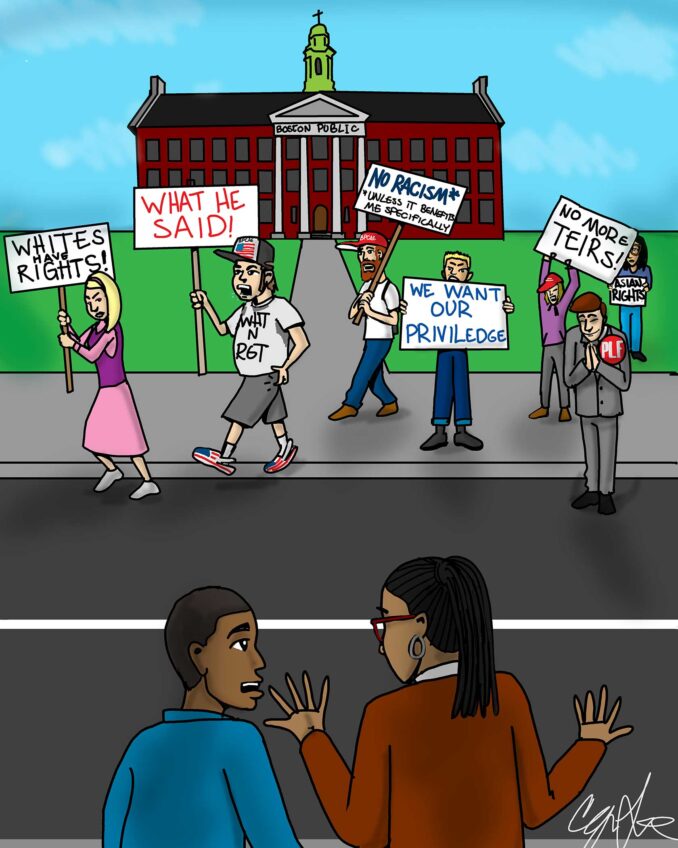How I wear my hair is my business. Ironically, the commonwealth decided it is now legal for me to do so.
Last week, Massachusetts lawmakers wrestled over whether to prohibit discrimination based on Black hair texture and hairstyles legally. The bill passed making Massachusetts the 15th state to uphold the Crown Act (Creating a Respectful and Open World for Natural Hair).
Also last week Congress made that decision, too. Last week, the House passed the CROWN Act in a vote of 235-189 along party lines, which is to say Democrats don’t mind if I wear my hair natural, but Republicans do.
In 2017, Mystic Valley Regional Charter School in Malden banned twins Deanna and Mya Cook from playing after-school sports and attending their prom because they wore hair extensions to school, violating school policy. Massachusetts Attorney General Maura Healey stepped in on the twins’ behalf. Healey sent a letter to the school flatly stating that its policy “includes a number of prohibitions that are either unreasonably subjective or appear to effectively single out students of color.”
In a milieu of anti-Blackness, discrimination doesn’t stop at skin color. It includes our dress style, music, dance, speech and hair, too. Our children are being humiliated and punished because of racist rules and policies that discriminate against their hair texture and natural hairstyles.
The criminalization of Black hair starts early for our children, sports being one of the areas. For example, in 2019, the video of a 16-year-old Black high school wrestler forced to cut off his dreadlocks to compete went viral. The white referee stated, “his hair and headgear did not comply with rules, and that if he wanted to compete, he would have to immediately cut his dreadlocks — or forfeit.”
In 2012, Olympic gymnast Gabby Douglas’s hair had been the topic of a ton of e-chatter once she stepped onto the Olympic world stage. A tsunami of criticisms poured in about Gabby’s over-gelled and under-tamed ponytail. And — yes, that very touchy subject for Black women — our nappy edges. The complaint fostered the misperception of how any put-together and accomplished sister with fleecy wooly wild hair could be happy being nappy.
In 2007, radio personality shock-jock Don Imus insulted the Rutgers women’s basketball team, calling them “some nappy-headed ’hos.” He struck a raw nerve. “Nappy” derogatorily referenced as a racial epithet, as Imus did, is the other N-word in the African American community.
Black women and girls endure some of the most stringent standards concerning our hair, with workplaces, institutions, and educators discriminating against us without repercussion. Still today, femininity and attractiveness are integrally linked to long, straight white women’s hair, a lauded Eurocentric aesthetic. However, Black women are pushing away from it.
In 2021, NBC Boston anchor Latoyia Edwards started to wear her hair naturally.
“For years, I had straightened my hair as a news anchor at NBC10 Boston and other television stations, an arduous process I believed was an unwritten necessity for Black, female news anchors,” Edwards told Boston.com. “This year, I decided it was time — beyond time — to wear my hair the way it feels right to me. For me, that meant braids. Regardless of the style, it’s long past time for Black girls and women to feel empowered to wear their hair how they choose — and for society to embrace them.”
In 2020, Rep. Ayanna Pressley revealed she had the autoimmune disorder alopecia, rendering her hairless. Pressley proudly and regally flaunted a bald head. Pressley, known for her signature Senegalese twists — her identity and political brand — was criticized as being “too ethnic” and “too urban.”
Black hairstyles are not criticized when they are being appropriated by white culture. In 1979, actress Bo Derek donned cornrows in her breakthrough film “10.” In 1980, People Magazine credited Derek for making the style a “cross-cultural craze.” In 2018, when Kim Kardashian posted a video on Snapchat of herself flaunting braids, she credited them as “Bo Derek braids.”
While many African American women today wear their hair in afros, cornrows, locks, braids, Senegalese twists, wraps or bald, our hair — both symbolically and literally — continues to be a battlefield in this country’s politics of hair and beauty aesthetics.
Black people have been in this country since 1619. It’s a shame both the Commonwealth and Congress are voting on the legitimacy of my hair in 2022.
Irene Monroe is a theologian and syndicated columnist.






